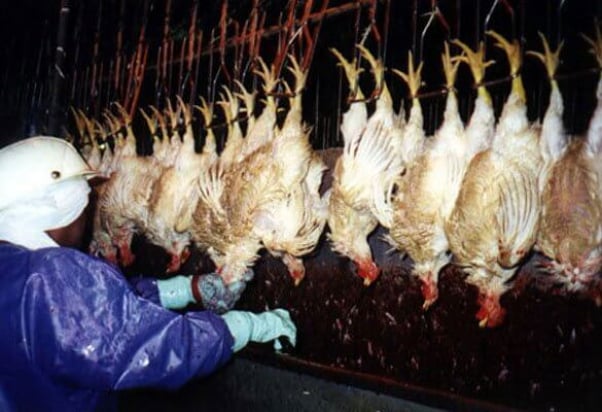VIDEO: ‘You’re Required to Hang 28 Birds a Minute,’ Tyson Whistleblower Says
It isn’t easy thinking about the things Lakesha Bailey and Shawn Ward have to say about working on Tyson slaughterhouse kill floors, but it’s more difficult—maybe impossible—to listen to their stories and still eat chicken.
Bailey worked at a Tyson slaughterhouse in Virginia—the one where 257 workers tested positive for the novel coronavirus and at least one worker died of COVID-19. She quit in May out of concern that she would expose her mother to the virus. Ward currently works at a Tyson slaughterhouse in Shelbyville, Tennessee, where 79 workers have tested positive for the virus. The two recently shared their stories with PETA.
Bailey and Ward report that on the high-speed slaughter line, there’s no way to practice social distancing—because if workers don’t stay close together and work quickly, they’ll be disciplined.
Ever wondered how many chickens Tyson kills each day? Ward told PETA, “You’re required to hang 28 birds a minute, so that’s over 12,000 birds a shift per person.” Bailey said, “They clock you. They time you. And if you don’t meet that, they’ll write you up. So how can you social-distance in there, you know, with demands that high? It’s highly impossible.”

Bailey says that Tyson didn’t distribute masks until two weeks after the first outbreak, and Ward says that workers are given only one mask and one pair of easily torn gloves per day.
“The gloves that they give us do tear very easily because of the claws on chickens,” Ward said. “You’re using the same gloves for eight hours, and they’re just plastic gloves. You can just picture how easy it is to rip them.”
The kill floors of slaughterhouses are notoriously soaked with blood, urine, and other bodily fluids. According to Bailey, the bodily fluids include those of workers, too: “It’s a good chance that the sweat can actually fall onto the product because it is that hot,” she recalled. Ward echoed her report:
“You have the hairnets on, you have the face mask on, and you’re working seven and a half hours of constant reaching and hanging. You’re bound to just pour down with sweat,” Ward admitted. “You’re supposed to wash your hands before you get to the workstation, but that does not mean that everybody does that. There’s no one there to supervise you.”
For Animals and Workers, Please, Go Vegan
Bailey is encouraging other fed-up slaughterhouse workers to join her in taking a stand.
“For anyone working for Tyson or any [other] poultry plant that’s feeling scared in this pandemic, don’t be scared to speak out. You can go get another job, but you only have one chance to live,” she says.
Kind consumers are responsible for taking an important step, too: Don’t wait for Tyson to do the right thing—you could be waiting a long time. The best way to save chickens is to refuse to eat them. Everyone can help protect chickens and workers by going vegan.

